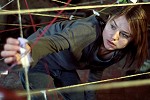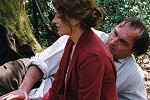 Shadows off the beaten path
Shadows off the beaten pathLADY CHATTERLEY | 12:08 EAST OF BUCHAREST
< < F O R E I G N > >
last update 27.Jun.07
See also: SHADOWS FILM FESTIVAL
 R E V I E W B Y R I C H C L I N E
R E V I E W B Y R I C H C L I N E Écoute le Temps
Écoute le Temps
 Haunting and enigmatic, this low-key French thriller plays around with ideas of memory and history to create an intriguingly surreal murder mystery.
Haunting and enigmatic, this low-key French thriller plays around with ideas of memory and history to create an intriguingly surreal murder mystery.
After her mother's sudden death, sound recordist Charlotte (Dequenne) returns home to sort out the details. But she soon discovers that, by placing her microphone around the sitting room, she can hear events from the past, all the way to her childhood--including private moments between her mother (Mikael) and a local organic farmer (Demy), the mayor (Chicot), and a shy neighbour (Flender) who's always had a thing for Charlotte. These sounds give Charlotte an intriguing glimpse into her own past and her mother's life, right up to the moment of her death.
Writer-director Kavaite takes what could be a run-of-the-mill whodunit and weaves it into a seriously introspective creep-out with a light supernatural touch. Most of the story is told in Dequenne's expressive face, as she struggles with the realities of her mother's death, as well as the complicated picture of her mother as a village clairvoyant who everyone called a witch, then secretly went to see for help. With very little dialog, Kavaite perhaps too cleverly captures a real sense of depth and intrigue within this tight little community.
And by slowly dribbling out the details surrounding both mother and daughter, the film catches the secrecy and emotion in the situation--guilt, regret, anger and ultimately fear. A parallel story about a missing little boy adds to the unsettling atmosphere, as does Charlotte's history with the various villagers, the potential political scandal and local environmental protests. None of these things are apparently connected to the central conundrum, but they enrich the underlying themes and add to the relationships.
And of course there's also the magical-realist elements of the story--Charlotte's eerie ability to record sounds from the past (the original title translates literally as "listen to time"), along with the fissures that run down the walls of her mother's house, and of course within the community. All of this is assembled with insinuating skill by Kavaite into a gripping, involving, beautifully unfolding mystery.
with Émilie Dequenne, Mathieu Demy, Bruno Flender, Ludmila Mikaël, Etienne Chicot, Eva Ionesco, Nadia Barentin, Jacques Spiesser, Gilles David, Joël Lefrançois, Chrystelle Labaude, Roland Marchisio
 release Fr 6.Jun.07,
release Fr 6.Jun.07, UK 17.Aug.07
07/France 1h27
20.Jun.07
 R E V I E W B Y R I C H C L I N E
R E V I E W B Y R I C H C L I N E Flandres
Flandres
 Haunting and deeply provocative, Dumont continues his abrasively brilliant film career with what could be the most raw and honest war movie ever made.
Haunting and deeply provocative, Dumont continues his abrasively brilliant film career with what could be the most raw and honest war movie ever made.
Andre (Boidin) is a farmer in northern France whose girlfriend Barbe (Leroux) has a problem with fidelity. It's not exactly a secret; her best friend (Decaesteker) admits that everyone calls her a slut. But Andre has other things on his mind, as he's called up for military service and heads off to a desert battlefield with two of his friends (Cretel and Venant). In war the solders are both brutally vicious and victims of brutal attacks, while back home Barbe has issues of her own. Is it possible to ever go back to the way things were?
Dumont shoots this in long, often quiet takes that build the tension remarkably. In the unvarnished beauty of the French countryside, storm clouds gather overhead while couples have passionless, primitive sex in the woods. In the dust-filled deserts, women and children are both victims and assailants, conventional morality is thrown out the window and unspeakable horror is an everyday experience for everyone. This is the world turned upside-down and inside-out, the point where humanity disappears completely. And what remains is only a vague attempt to mimic the real thing.
Everything about this film is muted and natural, with an earthy and believable non-professional cast in superb landscapes that bristle with ambient sound. Almost every scene takes place outdoors, giving an introspective, thoughtful, connected tone to such contrasting settings as the snowy French countryside and the bombed-out, dusty Arabian villages. The action is eerily authentic, with unseen snipers, surprise bombs and the constant threat of real death creating an almost overpowering sense of fear, anger and guilt.
Yes, this is extremely bleak stuff, and Dumont never makes it easy. He refuses to sentimentalise the relationships or sensationalise the violence. Life and death are sudden and surprising, emotions are complex, revenge is definitive and not very sweet. The characters are haunted by their unspeakable actions, even as they justify them to themselves. This is bold, powerful filmmaking that simply refuses to accept Hollywood's sanitised version of life on earth.
with Adélaïde Leroux, Samuel Boidin, Henri Cretel, Jean-Marie Bruveart, David Poulain, Patrice Venant, David Legay, Inge Decaesteker

release Fr 30.Aug.06,
US 18.May.07,
UK 6.Jul.07
06/France 1h31
CANNES FILM FEST
TORONTO FILM FEST
5.Jul.07
 R E V I E W B Y R I C H C L I N E
R E V I E W B Y R I C H C L I N E
 Based on DH Lawrence's second version of this story (he wrote three), this film takes a much more intimate, sensual and natural approach to the familiar story. And it's beautifully filmed, with strikingly raw performances.
Based on DH Lawrence's second version of this story (he wrote three), this film takes a much more intimate, sensual and natural approach to the familiar story. And it's beautifully filmed, with strikingly raw performances.
Constance Chatterley (Hands) is bored out of her mind in her massive manor house in the 1920s English countryside. Her husband Clifford (Girardot) was wounded in the war, and is confined to a wheelchair, leaving Constance feeling trapped as well. One day walking in the woods, she notices that their gamekeeper Parkin (Coulloc'h) is a picture of raw masculine health. And after tentatively speaking to each other, their mutual attraction takes over. The surprise for both of them is that their fling actually turns into a deep attraction; they can't live without each other.
Filmmaker Ferran tells this story with a disarmingly gentle style that looks almost painterly. She lets the scenes move at their own pace, capturing the connections between the characters and nature, allowing the relationship between Constance and Parkin to evolve slowly but surely. And for a film that feels so slow and steady, it's remarkably gripping. The initial lust in Constance's eyes gives way to urgent animal impulses, with each successive sex scene becoming increasingly intimate--starting fully clothed and eventually running naked in the rain.
Hands, Coulloc'h and Girardot are superb, cleverly bringing out the subtext that runs through all of the dialog and underplaying the telling glances to bring out their characters' inner lives. Large chunks of the film are free of dialog, so the story is told in the faces of the actors, which makes it thoroughly involving. This also brings out the complexities and contradictions within the characters--for example, the manly Parkin has a profoundly sensitive soul, yet living off a woman is unthinkable to him.
The relentless silence in the film sometimes makes us feel the lengthy running time. Ferran cut this film down from a nearly four-hour TV movie, but some scenes still feel overlong or unnecessary. And there's an oddly stilted, deadpan narration every now and then. Even so, the film is remarkably sensuous, moving and thoughtful. You can understand why it won so many Cesar awards.
scr Roger Bohbot, Pascale Ferran
with Marina Hands, Jean-Louis Coulloc'h, Hippolyte Girardot, Hélène Alexandridis, Hélène Fillières, Bernard Verley, Sava Lolov, Jean-Baptiste Montagut, Michel Vincent, Christelle Hes, Joël Vandael, Ninon Brétécher

release Fr 1.Nov.06,
US 22.Jun.07,
UK 24.Aug.07
06/France 2h48
30.May.07
 R E V I E W B Y R I C H C L I N E
R E V I E W B Y R I C H C L I N E A Fost Sau n-a Fost?
A Fost Sau n-a Fost?
 With a bone-dry sense of humour, Romanian filmmaker Porumboiu astutely examines the true meaning of the word "revolution" and what it signifies for a specific community.
With a bone-dry sense of humour, Romanian filmmaker Porumboiu astutely examines the true meaning of the word "revolution" and what it signifies for a specific community.
It's the 16th anniversary of the 1989 Romanian revolution, and TV host Virgil (Corban) is trying to put together a commemorative programme in a provincial city dominated by a hideous Soviet-style town hall, pictured in the studio backdrop. But the only guests he can drum up are a drunken history professor (Sapdaru) and a grumpy old man (Andreescu) who's fed up with kids constantly blowing up fireworks at his front door. The question at hand is whether the people of the town were protesting before or after Ceaucescu's departure from power at 12:08.
The title translates literally as, "Was it a revolution or wasn't it?" And the film playfully grapples with the events of 1989, and what they meant for the people of this town. After a few free-wheeling opening scenes, in which we meet the three central characters in their everyday lives, the film settles into the studio for the programme, during which both guests misbehave hilariously and callers ring in with amusingly provocative comments.
Porumboiu's writing and directing style is wry and relaxed, using long takes to catch the action and reactions, drawing extremely natural performances from the actors, and cleverly teasing out the subtext. It's the serious themes gurgling underneath that make the film so thoroughly engaging. And the scenes are played to deadpan perfection by the cast.
Each of the central trio of characters has deeply personal issues that resonate with Romania and the Eastern Bloc, as well as with each of us as viewers--hidden pasts, bad debts, daily annoyances, embarrassing flaws. The history students have tellingly failed the Ottoman Empire exam, and the more recent events obviously mean even less to them as they look blindly forward. The younger kids are only interested in firecrackers.
This is extremely clever filmmaking--sharp and very funny, but also challenging and packed with relevance. It plays with big concepts of nationalism and smaller issues of community inter-dependence. Everyone wants to erase their own personal history, and perhaps that's where the real revolution took place.
with Teodor Corban, Ion Sapdaru, Mircea Andreescu, Cristina Ciofu, Luminita Gheorghiu, Lucian Iftime, Mirela Cioaba, Constantin Dita
 release Rom 29.Sep.06,
release Rom 29.Sep.06, US 6.Jun.07,
UK 17.Aug.07
06/Romania 1h29
CANNES FILM FEST
TORONTO FILM FEST
LONDON FILM FEST
6.Jun.07


See also: SHADOWS FILM FESTIVAL | SHORT FILMS
© 2007 by Rich Cline, Shadows
on the Wall